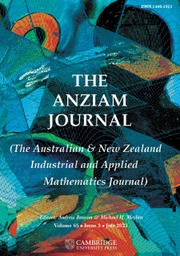Crossref Citations
This article has been cited by the following publications. This list is generated based on data provided by Crossref.
Jittorntrum, Krisorn
1984.
Sensitivity, Stability and Parametric Analysis.
Vol. 21,
Issue. ,
p.
127.
Osborne, M. R.
1987.
Dual barrier functions with superfast rates of convergence for the linear programming problem.
The Journal of the Australian Mathematical Society. Series B. Applied Mathematics,
Vol. 29,
Issue. 1,
p.
39.
Murray, Walter
1989.
Algorithms and Model Formulations in Mathematical Programming.
p.
115.
Neittaanm�ki, Pekka
and
Stachurski, Andrzej
1992.
Solving some optimal control problems using the barrier penalty function method.
Applied Mathematics & Optimization,
Vol. 25,
Issue. 2,
p.
127.
Conn, Andrew R.
Gould, Nick
and
Toint, Philippe L.
1994.
Algorithms for Continuous Optimization.
p.
287.
Breitfeld, Marc G.
and
Shanno, David F.
1994.
Large Scale Optimization.
p.
45.
Suwartadi, Eka
Krogstad, Stein
and
Foss, Bjarne
2010.
A Lagrangian-barrier function for adjoint state constraints optimization of oil reservoirs water flooding.
p.
3884.
Nash, Stephen G.
2011.
Wiley Encyclopedia of Operations Research and Management Science.
Curtis, Frank E.
2012.
A penalty-interior-point algorithm for nonlinear constrained optimization.
Mathematical Programming Computation,
Vol. 4,
Issue. 2,
p.
181.
Suwartadi, Eka
Krogstad, Stein
and
Foss, Bjarne
2012.
Nonlinear output constraints handling for production optimization of oil reservoirs.
Computational Geosciences,
Vol. 16,
Issue. 2,
p.
499.
Andrei, Neculai
2017.
Continuous Nonlinear Optimization for Engineering Applications in GAMS Technology.
Vol. 121,
Issue. ,
p.
203.
Andrei, Neculai
2017.
Continuous Nonlinear Optimization for Engineering Applications in GAMS Technology.
Vol. 121,
Issue. ,
p.
47.
Andrei, Neculai
2022.
Modern Numerical Nonlinear Optimization.
Vol. 195,
Issue. ,
p.
475.




